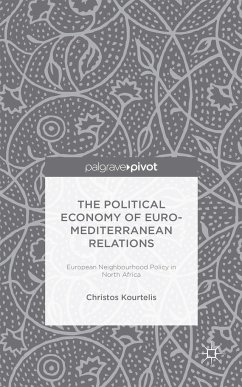
Gebundenes Buch
The Substance of EU Democracy Promotion
Concepts and Cases
Herausgegeben: Wetzel, A.; Orbie, J.
Versandkostenfrei!
Versandfertig in 6-10 Tagen

PAYBACK Punkte
19 °P sammeln!





The book investigates the substance of the European Union's (EU) democracy promotion policy. It focuses on elections, civil and political rights, horizontal accountability, effective power to govern, stateness, state administrative capacity, civil society, and socio-economic context as components of embedded liberal democracy.
Müge Aknur, Dokuz Eylül University, Turkey. Canan Balk?r, Dokuz Eylül University, Turkey. Federica Bicchi, London School of Economics and Political Science, UK. Fabienne Bossuyt, Ghent University, Belgium. Maurizio Carbone, University of Glasgow, UK. Bekim Çollaku, Prime Minister's Cabinet, Kosovo. Karen Del Biondo, Freie Universität Berlin, Germany. Eline De Ridder, Flemish Department of Education and Training, Belgium. Labinot Greiçevci, Research Institute of Development and European Affairs (RIDEA), Kosovo. Dimitry Kochenov, University of Groningen, the Netherlands. Hrant Kostanyan, Ghent University, Belgium. Paul Kubicek, Oakland University, USA. Milja Kurki, Aberystwyth University, UK. Vicky Reynaert, independent scholar. Andrea Ribeiro Hoffmann, Freie Universität Berlin, Germany. Jessica Schmidt, Centre for Global Cooperation Research, Duisburg, Germany. Susan Stewart, German Institute for International and Security Affairs (SWP), Germany. Benedetta Voltolini, Maastricht University, the Netherlands.
Produktdetails
- Governance and Limited Statehood
- Verlag: Palgrave Macmillan / Palgrave Macmillan UK / Springer Palgrave Macmillan
- Artikelnr. des Verlages: 978-1-137-46631-0
- 2015 edition
- Seitenzahl: 312
- Erscheinungstermin: 26. Februar 2015
- Englisch
- Abmessung: 216mm x 140mm x 19mm
- Gewicht: 532g
- ISBN-13: 9781137466310
- ISBN-10: 1137466316
- Artikelnr.: 41645510
Herstellerkennzeichnung
Libri GmbH
Europaallee 1
36244 Bad Hersfeld
gpsr@libri.de
"It addresses a very important and challenging topic by offering extremely rich and well-organised material. ... book is balanced both in terms of depth of analysis and breadth of empirical evidence. The use of a solid theoretical framework, the smart selection of cases, and a wide range of primary and secondary resources make the book a reliable source of information and insights for researchers and students ... . an engaging and substantial addition to the democratisation and democracy promotion literature." (Aijan Sharshenova, Europe-Asia Studies, Vol. 68 (2), 2016)
"The editors have gathered a good group of contributors predominantly with area expertise which guarantees the empirical research. ... In any case, the book is a highly valuable addition to the literature on democracy promotion." (Carlos Closa Montero, JCMS Journal of Common Market Studies, Vol.54 (6), 2016)
"The editors have gathered a good group of contributors predominantly with area expertise which guarantees the empirical research. ... In any case, the book is a highly valuable addition to the literature on democracy promotion." (Carlos Closa Montero, JCMS Journal of Common Market Studies, Vol.54 (6), 2016)
Für dieses Produkt wurde noch keine Bewertung abgegeben. Wir würden uns sehr freuen, wenn du die erste Bewertung schreibst!
Eine Bewertung schreiben
Eine Bewertung schreiben
Andere Kunden interessierten sich für











